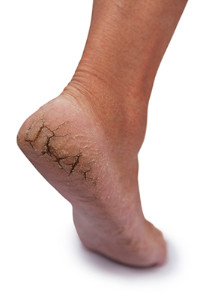NJ (908) 688-5577
NY (212) 737-2528
 Patients who suffer from the unsightly condition that is known as cracked heels may be familiar with the pain and discomfort, which may be associated with this ailment. It is defined as deep cracks, which may also be known as fissures, which form on the heel of the foot. It may originate from wearing shoes that have open backs, which do not provide adequate support the heels need, in addition to having medical conditions such as obesity, psoriasis, or dermatitis. Research has shown that patients who experience underactive thyroid imbalances may develop cracked heels. This may be a result of sweat glands, located in the feet, being under regulated, and can possibly cause the skin to become excessively dry. If you have developed cracked heels, it is strongly advised to consult with a podiatrist who can determine the cause of this condition and guide you to begin correct treatment.
Patients who suffer from the unsightly condition that is known as cracked heels may be familiar with the pain and discomfort, which may be associated with this ailment. It is defined as deep cracks, which may also be known as fissures, which form on the heel of the foot. It may originate from wearing shoes that have open backs, which do not provide adequate support the heels need, in addition to having medical conditions such as obesity, psoriasis, or dermatitis. Research has shown that patients who experience underactive thyroid imbalances may develop cracked heels. This may be a result of sweat glands, located in the feet, being under regulated, and can possibly cause the skin to become excessively dry. If you have developed cracked heels, it is strongly advised to consult with a podiatrist who can determine the cause of this condition and guide you to begin correct treatment.
Cracked heels are unsightly and can cause further damage to your shoes and feet. If you have any concerns, contact Glenn Davison, DPM from Advanced Podiatry. Our doctor can provide the care you need to keep you pain-free and on your feet.
Cracked Heels
Cracked heels appear unappealing and can make it harder for you walk around in sandals. Aside from looking unpleasant, cracked heels can also tear stockings, socks, and wear out your shoes. There are several methods to help restore a cracked heel and prevent further damage.
How Do You Get Them?
Dry skin is the number one culprit in creating cracked heels. Many athletes, walkers, joggers, and even swimmers suffer from cracked heels. Age and skin oil production play a role to getting cracked heels as well.
Promote Healing
Over the counter medicines can help, especially for those that need instant relief or who suffer from chronic dry feet.
Wear Socks – Wearing socks with medicated creams helps lock in moisture.
Moisturizers – Applying both day and night will help alleviate dryness which causes cracking.
Pumice Stones – These exfoliate and remove dead skin, which allows for smoother moisturizer application and better absorption into the skin.
Change in Diet
Eating healthy with a well-balanced diet will give the skin a fresh and radiant look. Your body responds to the kinds of food you ingest. Omega-3 fatty acids and zinc supplements can also revitalize skin tissue.
Most importantly, seek professional help if unsure how to proceed in treating cracked heels. A podiatrist will help you with any questions or information needed.
If you have any questions, please feel free to contact our offices located in Union, NJ and New York . We offer the newest diagnostic and treatment technologies for all your foot care needs.